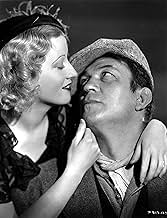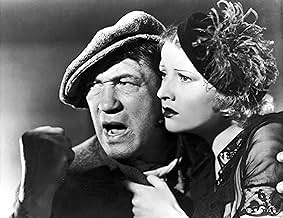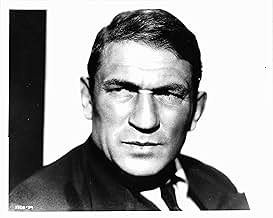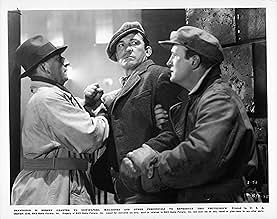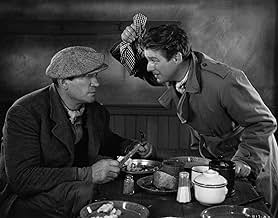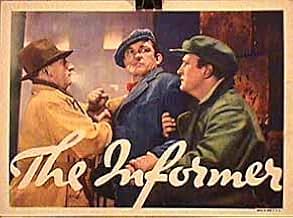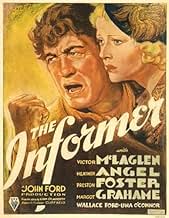IMDb RATING
7.4/10
7.4K
YOUR RATING
In 1922, an Irish rebel informs on his friend, then feels doom closing in.In 1922, an Irish rebel informs on his friend, then feels doom closing in.In 1922, an Irish rebel informs on his friend, then feels doom closing in.
- Won 4 Oscars
- 10 wins & 4 nominations total
Joe Sawyer
- Barty Mulholland
- (as Joseph Sauers)
Steve Pendleton
- Dennis Daly
- (as Gaylord Pendleton)
Denis O'Dea
- Street Singer
- (as Dennis O'Dea)
Frank Baker
- Small Role
- (uncredited)
- Director
- Writers
- All cast & crew
- Production, box office & more at IMDbPro
Storyline
Did you know
- TriviaJohn Ford kept Victor McLaglen continually off-balance (and thus in character) by getting him drunk, changing his schedules, verbally abusing him on and off the set and filming scenes when he'd told McLaglen that they were only rehearsing. For the crucial rebel court scene, the story goes that Ford reduced the actor to a trembling wreck by promising him the day off only to bring him into the studio early and extremely hung over, insisting that he spit out his lines. McLaglen was so furious with Ford over this that he threatened to quit acting and kill the director.
- GoofsFrankie McPhillip tells his mother he travelled to her house via O'Connell Street. In 1922, the year the movie is set, O'Connell Street was still offically called Sackville Street, but the Irish Home Rule Party had unsuccessfully attempted to change it to "O'Connell Street" prior to this and this name was commonly used by nationalist Dubliners.
- Quotes
Gypo Nolan: And now the British think I'm with the Irish, and the Irish think I'm with the British. The long and short of it is I'm walkin' around without a dog to lick my trousers!
- Crazy creditsOpening credits prologue: 1920 "Then Judas repented himself-and cast down the thirty pieces of silver - and departed."
- Alternate versionsSince it's original release, the UK prints of this film have omitted all references to the IRA, but a 1998 release on a budget video label restores these cuts for the first time.
- ConnectionsFeatured in Directed by John Ford (1971)
Featured review
A lot of movies of John Ford (Sean O'Feeney) deal with Ireland.At every stage of a long and brilliant career,he gets back to his roots in his homeland:"the informer" and "the plough and the stars" are early period;"the quiet man " is middle, "young Cassidy" is late.
Far from being "one of the worst movies of the thirties" ,"the informer " belongs to its time:that's true that the studios deny realism but that was true for Fritz Lang's "M" and Marcel Carné's "réalisme poétique" too.Anyway,at a pinch,no matter if it's a political subject in the Ireland of the twenties:what Ford has to say to us is universal:when a man betrays his best friend,be it for thirty coins of silver or for twenty quids,he will be eaten with remorse ,everything that he'll see and hear will remember him of the awful thing he's done.Gypo won't take advantage of his pitiful reward,he will loose everything except the victim's mother's compassion and forgiveness. All through this dark movie,Gypo will roam the foggy streets ,a desperate man:you should not forget that he is an outcast from the beginning:dismissed by the IRA,because he hadn't guts enough to kill a prisoner,and outside a girl,and Jackie (the man he will betray),he's on his own ,a man who suffers from hunger and,worse, lack of self-esteem -the one time when he finds solace is when he has a rest near his girl's fireplace-This character is not that much far from Peter Lorre's part in "M":both movies feature a secret trial.
As always in Ford's cinema,women are figures of peace love and understanding,and for them a man can always redeem his soul: here Katie and the mother.In "quiet man" ,Wayne is given a second chance thanks to Ireland and... Maureen O'Hara.And after all Ford's last movie will be "seven women" (1966) :a doctor(Ann Bancroft) will triumph over barbary against all odds.
Far from being "one of the worst movies of the thirties" ,"the informer " belongs to its time:that's true that the studios deny realism but that was true for Fritz Lang's "M" and Marcel Carné's "réalisme poétique" too.Anyway,at a pinch,no matter if it's a political subject in the Ireland of the twenties:what Ford has to say to us is universal:when a man betrays his best friend,be it for thirty coins of silver or for twenty quids,he will be eaten with remorse ,everything that he'll see and hear will remember him of the awful thing he's done.Gypo won't take advantage of his pitiful reward,he will loose everything except the victim's mother's compassion and forgiveness. All through this dark movie,Gypo will roam the foggy streets ,a desperate man:you should not forget that he is an outcast from the beginning:dismissed by the IRA,because he hadn't guts enough to kill a prisoner,and outside a girl,and Jackie (the man he will betray),he's on his own ,a man who suffers from hunger and,worse, lack of self-esteem -the one time when he finds solace is when he has a rest near his girl's fireplace-This character is not that much far from Peter Lorre's part in "M":both movies feature a secret trial.
As always in Ford's cinema,women are figures of peace love and understanding,and for them a man can always redeem his soul: here Katie and the mother.In "quiet man" ,Wayne is given a second chance thanks to Ireland and... Maureen O'Hara.And after all Ford's last movie will be "seven women" (1966) :a doctor(Ann Bancroft) will triumph over barbary against all odds.
- dbdumonteil
- May 10, 2002
- Permalink
- How long is The Informer?Powered by Alexa
Details
Box office
- Budget
- $243,000 (estimated)
- Runtime1 hour 31 minutes
- Color
- Aspect ratio
- 1.37 : 1
Contribute to this page
Suggest an edit or add missing content



